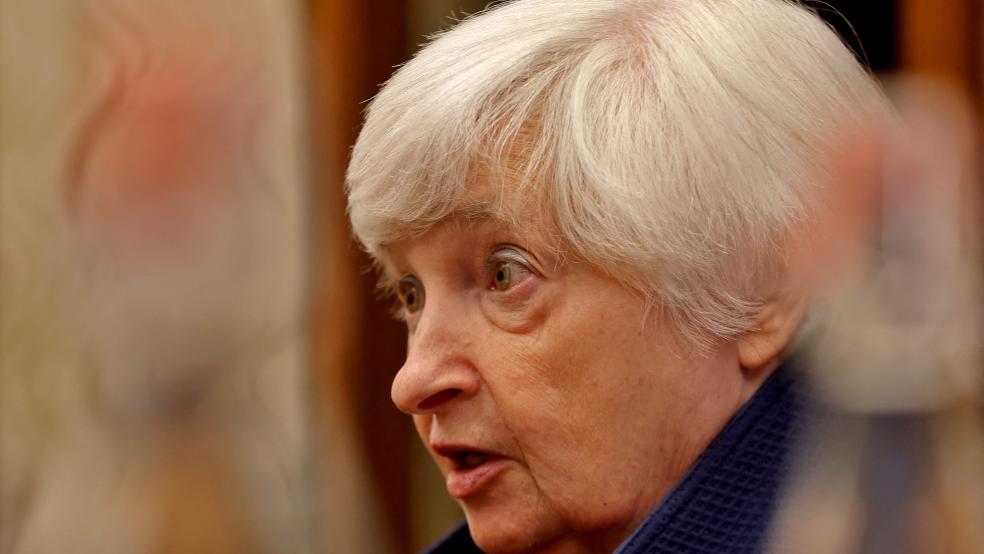Negotiators for President Joe Biden and House Republicans are still working to lock down a deal to set federal spending levels, raise the nation’s borrowing limit and avoid a potentially calamitous U.S. debt default. As the talks continue, Treasury Secretary Janet Yellen on Friday afternoon announced that the deadline for raising the debt limit will be June 5.
“Based on the most recent available data, we now estimate that Treasury will have insufficient resources to satisfy the government’s obligations if Congress has not raised or suspended the debt limit by June 5,” Yellen wrote in a letter to congressional leaders.
Yellen had previously said that the deadline would fall in early June and could be as soon as June 1, so her latest update provides negotiators with more breathing room to finalize a deal. At the same time, the letter makes it clearer than ever that the Treasury will not be able to make it to June 15, when an expected inflow of revenues could have extended the default deadline to late July or beyond.
Yellen told lawmakers that Treasury will make more than $130 billion of scheduled payments in the first two days of June, including payments to veterans and Social Security and Medicare recipients. “These payments will leave Treasury with an extremely low level of resources,” she wrote. The funds remaining are projected to fall short of what would be needed to cover an estimated $92 billion of payments and transfers due the week of June 5.
Yellen also said that the Treasury Department yesterday used an additional extraordinary measure that it has employed in the past to buy a bit more time, swapping about $2 billion of Treasury securities between the Civil Service Retirement and Disability Fund and the Federal Financing Bank. “While this measure has not been used since 2015 due to its limited size, the extremely low level of remaining resources demands that I exhaust all available extraordinary measures to avoid being unable to meet all of the government’s commitments,” she wrote.
Where negotiations stand: The two sides are still inching toward an agreement that could lift the federal borrowing limit and cap spending for two years. Defense and veterans spending reportedly would be increased to the levels Biden proposed in his 2024 budget request.
"Things are looking good. I'm very optimistic," Biden said Friday evening, adding he's hopeful they'll know by tonight whether they have a deal.
The two sides are just $70 billion apart on a spending total that would far exceed $1 trillion, Reuters reported.
A couple of sticking points are preventing negotiators from clinching a deal, though — most notably the GOP insistence on additional work requirements for food stamps, cash assistance and health care.
“Each time there is forward progress, the issues that remain become more difficult and more challenging,” Republican Rep. Patrick McHenry, one of the negotiators, told reporters on Friday, adding, “at some point this thing could come together or go the other way.”
McCarthy has insisted that any deal must include stiffer work requirements, while most Democrats are staunchly opposed to them. Asked if Republicans would be willing to drop their push for work requirements to finalize a deal, Rep. Garret Graves, another GOP negotiator, said: “Hell no. Hell no. Not a chance.”
A potential deal provision that would rescind some funding for the Internal Revenue Service and use the money for other domestic programs reportedly also remains unsettled.
Doing the math on votes: Getting an agreement isn’t enough — the two sides also have to ensure their deal has enough support to pass both chambers of Congress. Some conservative Republicans are rebelling against the compromise based on the details and rumors that have emerged so far. And House Democratic leaders reportedly warned the White House that it can’t assume that several dozen of their members will automatically back any deal that Biden cuts — especially if it includes tougher work requirements.
McCarthy on Friday dismissed conservative criticisms and concerns about holdouts derailing a deal. “You’re talking to people who don’t know what’s in the deal,” he told reporters. “I’m not concerned about anybody making any comments right now about what they think is in or not in. Whenever we come to an agreement, we’ll make sure we will first brief our entire conference.”
What’s next: While the talks continue, the House has recessed until Tuesday. McCarthy is reportedly staying in the capital for the weekend. Biden was scheduled to depart for Camp David this evening and then travel to his home in Wilmington, Delaware, Sunday.





